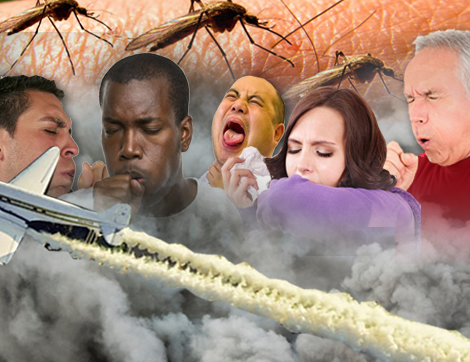
Residents of Miami Beach, Fla., garnered attention around the world recently after protesting the aerial spraying in their communities of naled, a controversial pesticide being used purportedly to kill mosquitoes thought to carry the Zika virus. While they have not been able to stop the spraying, they have brought attention to the toxic chemical.
By James Spounias
This writer reported in depth on lies being told about Zika, mosquitos, and naled in AFP’s Sept. 12 & 19 edition. The establishment narrative makes the unsupported conclusion that mosquitos carry the Zika virus, which is implicated in microcephaly, a horrific condition where the brains of babies fail to develop in the womb.
It is folly to believe the aerial spraying of naled, a pesticide banned by the European Union, is an effective way of killing the “Zika-carrying” mosquito (Aedes aegypti), because the mosquitos in question are low-flying.
Make no mistake: Naled does kill. For example, the aerial use of naled was linked to the death of millions of bees in Dorchester County, S.C. on Aug. 31. One local beekeeper described the death of a bee sprayed with naled as, “like it’s been nuked,” according to The Washington Post. Naled also kills other bugs, including beneficial insects such as dragonflies, which feed on mosquitos, and parasitoid wasps.
Emigrate While You Still Can! Learn More . . .
The No Spray Coalition is an organization set up to fight local officials who want to saturate the Southeast with toxic pesticides. A spokesman for the group told reporters: “Researchers from the New York Department of Health showed that 11 years of naled spraying was ‘successful in achieving short-term reductions in mosquito abundance,’ but populations of the disease-carrying mosquito of concern ‘increased 15-fold over the 11 years of spraying.’ ”
Does one need a Nobel Prize to conclude that killing off nature’s own mosquito-killers such as dragonflies would actually result in leaving more disease-carrying mosquitos alive?
Scientists, who cite evidence questioning the
tenuous link between Zika and microcephaly, as well as the wisdom of the aerial spraying of a banned pesticide to kill mosquitos flying near the ground, have been dragged through the mud as anti-science primates.
There is an agenda: Frighten the public, spray dangerous pesticides, develop vaccines, and use the “crisis” to erode individual liberty.
There is some good news. Pushback from Miami Beach residents who question the rationale for spraying naled are making headway. Miami Beach residents have been subjected to intense spraying of naled and some are reporting side effects, such as rashes, bloody noses, vomiting, and difficulty breathing, according to Miami activists.
During a Miami Beach City Commission hearing on Sept. 14, hundreds of local residents packed the city council hall, demanding naled spraying be stopped.
Michael Grieco, a gutsy city commissioner, proposed a motion to block all use of naled in the City of Miami Beach and to allow the city attorney to take legal action against Dade County and Florida if the spraying is not stopped. The city cannot simply stop spraying naled because the county has jurisdiction over mosquito spraying.
Unfortunately, the commission let Grieco’s motion die, while giving lip service to concerns. The commission recommended that Miami Beach consider alternatives to naled, such as BTI and genetically modified mosquitos, as well as creating a panel of mosquito control scientists to study the issue. Many activists were unsatisfied with these recommendations, finding that BTI and GMO mosquitos have their own sets of problems affecting human health.
The Miami Herald disparaged activists in a Sept. 15 hit piece entitled “Zika spraying spawns an epidemic of conspiracy theories,” calling protestors “rabble” and accusing them of using “Google based” science.
However, establishment smears aren’t working. Miami Beach businessman Michael Capponi and Brendan Burke founded the South Florida Poison Response Coalition to alert the public to the dangers of naled spraying.
Capponi stated: “Our mission is very clear. Naled is toxic and is causing harm to our community and residents. . . . It is our job to let the government and media see the damage naled is
causing. . . . No one can deny that hundreds of Miami residents have exhibited rashes and watery eyes within hours of naled being sprayed. Many of our children started vomiting after the aerial assaults.”
Pictures of rashes and eye irritation claimed to have been brought on by naled spraying have been posted on social media, such as Facebook and Instagram.
Capponi did state that if naled must be used, proper protocols must be followed. For instance, anti-naled activists cite EPA documents that state aerial spraying of naled on agricultural fields should be done 48 hours before any human enters the field. The irony is that naled is sprayed on residential populations with the assurance that because “small amounts” are used, it’s safe.
Capponi urges Miami residents to report ad- verse effects to Florida Poison Control at 800-222- 1222. And, fortunately, Michael J. Hall, a Miami Beach medical doctor, is providing local residents with a complimentary office visit and possible toxicological blood screen.
Naled spraying is being conducted nationwide. The EPA states on its website, “Naled is currently being applied by aerial spraying to about 16 million acres within the mainland United States as part of routine mosquito control. . . .”
According to the No Spray Coalition, “about one million pounds of naled are used every year in the U.S. Approximately 70% of this is used for mosquito control; almost all of this is applied aerially. The remaining 30% is used in agriculture. Major agricultural uses are on cotton in California and Louisiana, on alfalfa in Idaho and Oregon, and on grapes in California.”
Hopefully, Miami Beach activists will continue to dig into the dangers of naled and spark consciousness in the U.S. to yet another toxic danger
to health.
James Spounias is the president of Carotec Inc., originally founded by renowned radio show host and alternative health expert Tom Valentine.

